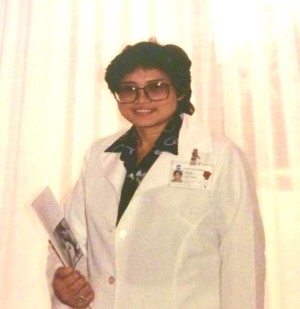
Eden Bautista Santiago refused to see herself as a second-class US citizen because of color and ethnicity. CONTRIBUTED
SAN FRANCISCO — Like most immigrants, Eden Bautista Santiago, 68, a retired nurse from Chicago, Illinois, experienced lots of difficulties before enjoying what she has now as a retiree, one who succeeded in reinventing herself.
Santiago was an English and physical education teacher at San Jose National High School in San Jose, Occidental Mindoro for eight years. On October 13, 1977, US Immigration approved her father’s petition.
With her two other sisters, who were also professionals, Santiago went to North Dakota where her brother was already a general surgeon at a local hospital in Turtle Lake. She did odd jobs, working in potato farm, as a substitute teacher and later as an office assistant at her brother’s clinic.
“I did not pursue teaching in the US because of the culture shock. The students were hard to control and they just called me by my first name,” she recalls.
Nursing as a new career
The family then moved to Berrein Springs, Michigan. At the time, nurses, particularly Filipinos, were in demand in the United States. Seeing that nurses got better salaries and inspired by her brother and sister-in-law, who was on her residency program, Santiago enrolled at Lake Michigan College. Since she already had a bachelor’s degree in the Philippines, she finished the nursing course in two years, with all her studies in the Philippines credited.
“I was the only Filipino in our class. But I stood on my ground and proved to myself that I was not a second-class citizen because of my color and ethnicity. I believe that capability is more important anywhere you go,” she says.
To sustain her studies, she worked as office manager for three doctors in three different offices. She says that it was really tedious because she took care of her aging father and nephews and nieces at the same time. In spite of that she was able to hurdle all difficulties.
Santiago passed the nursing board exam and worked at the oncology department in a hospital at Benton Harbor, Michigan. She was exposed to different kinds of patients suffering from various diseases. Luckily, there were other nurses of different ethnicities and, thus, she did not feel any discrimination.
In 1985, Santiago moved to Chicago and worked at Swedish Covenant Hospital. That year, her American citizenship was approved.
The brown American
All the benefits and privileges of US citizenship are available to her. Thus, when she badly injured her back after lifting a patient, she was transferred to the quality improvement/risk management department, which dealt with physicians’ and the hospital’s compliance with quality of care standards of practice.
Now retired, nurse Eden Bautista Santiago, standing, with sun visor, joins medical missions to parts of Occidental Mindoro to deliver health care to the poor. CONTRIBUTED
In a big city like Chicago, competition is very stiff. “I had to prove my worth. I was given the ‘nursing circle of excellence award’ in 1992, which is given to nurses with exceptional devotion to their profession,” Santiago says.
After twenty years of working at SCH, she retired at the age of 55. She started going home to the Philippines every winter to join medical missions in different parts of San Jose, Occidental Mindoro.
“I believe that giving back to your country of origin is both a privilege and a gesture of gratitude after you have been blessed and did well in your adopted country,” she explains.
Glut of nurses
Since Santiago started visiting the Philippines, she has noticed the growing population of nursing graduates who are underemployed, unemployed or lowly paid.
“I knew the difficulties of being a nurse. It is a noble profession like teaching and other professions. I pray and hope that someday our government will give a serious thought to their plight, to giving them better and more job opportunities with decent salaries and recognition for their services to humanity,” she sighs.
“To you, my fellow nurses, wherever you are, never lose hope and continue performing your duties with diligence, patience, passion and love. It takes a special person with compassionate heart to do this kind of work. Life is not all about money. It is also the joy and feeling of self-satisfaction from knowing that somehow you have alleviated someone’s pains, sufferings feelings of helplessness, loss and loneliness.”